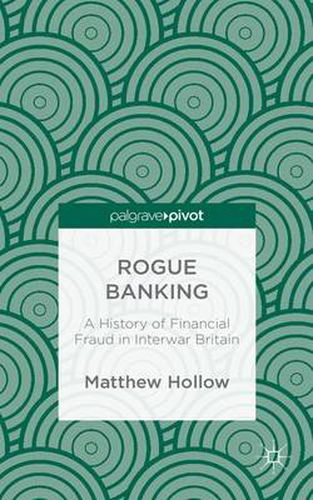Readings Newsletter
Become a Readings Member to make your shopping experience even easier.
Sign in or sign up for free!
You’re not far away from qualifying for FREE standard shipping within Australia
You’ve qualified for FREE standard shipping within Australia
The cart is loading…






This title is printed to order. This book may have been self-published. If so, we cannot guarantee the quality of the content. In the main most books will have gone through the editing process however some may not. We therefore suggest that you be aware of this before ordering this book. If in doubt check either the author or publisher’s details as we are unable to accept any returns unless they are faulty. Please contact us if you have any questions.
Since the turn of the millennium, the British media has been awash with stories of bankers and financiers caught engaging in acts of corporate wrongdoing and financial skullduggery. But just how different are these crimes to those committed in the past? And, is the threat of financial fraud greater today than in bygone years?
In this book, Matthew Hollow begins answering these questions by providing an in-depth historical overview of some of the most significant frauds that took place in the British financial sector between 1919 and 1939. Using extensive archival evidence, he reveals the variety of tactics that were employed by interwar fraudsters to conceal their underhand transactions and dupe the British public into handing over their money. He goes on to explore the different factors that motivated these fraudsters many of whom had previously had blemish-free records to engage in these acts of deception and deceit.
Rogue Banking is a unique resource for history and finance researchers and students, both in the UK and around the world, who are interested in questions relating to corporate fraud and white-collar crime. This book’s interdisciplinary approach also makes it an accessible and informative tool for professionals in accountancy, management and criminology.
$9.00 standard shipping within Australia
FREE standard shipping within Australia for orders over $100.00
Express & International shipping calculated at checkout
Stock availability can be subject to change without notice. We recommend calling the shop or contacting our online team to check availability of low stock items. Please see our Shopping Online page for more details.
This title is printed to order. This book may have been self-published. If so, we cannot guarantee the quality of the content. In the main most books will have gone through the editing process however some may not. We therefore suggest that you be aware of this before ordering this book. If in doubt check either the author or publisher’s details as we are unable to accept any returns unless they are faulty. Please contact us if you have any questions.
Since the turn of the millennium, the British media has been awash with stories of bankers and financiers caught engaging in acts of corporate wrongdoing and financial skullduggery. But just how different are these crimes to those committed in the past? And, is the threat of financial fraud greater today than in bygone years?
In this book, Matthew Hollow begins answering these questions by providing an in-depth historical overview of some of the most significant frauds that took place in the British financial sector between 1919 and 1939. Using extensive archival evidence, he reveals the variety of tactics that were employed by interwar fraudsters to conceal their underhand transactions and dupe the British public into handing over their money. He goes on to explore the different factors that motivated these fraudsters many of whom had previously had blemish-free records to engage in these acts of deception and deceit.
Rogue Banking is a unique resource for history and finance researchers and students, both in the UK and around the world, who are interested in questions relating to corporate fraud and white-collar crime. This book’s interdisciplinary approach also makes it an accessible and informative tool for professionals in accountancy, management and criminology.